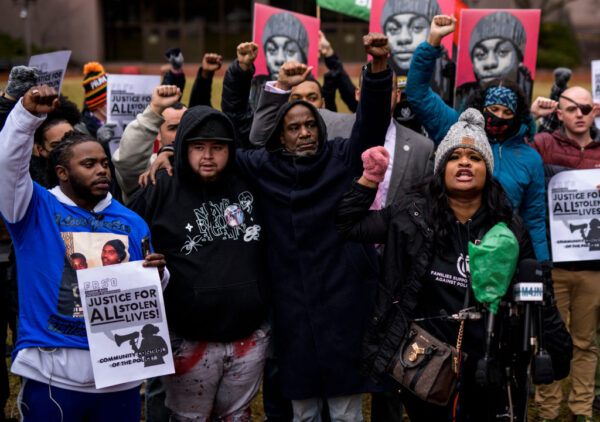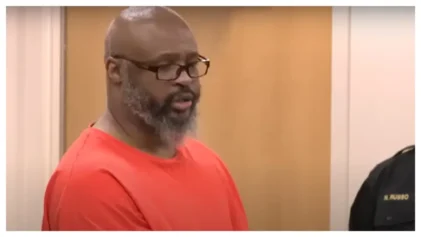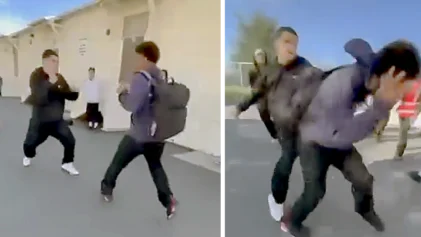One year after a member of the Minneapolis Police Department fatally shot Amir Locke, the young man’s parents have filed a federal civil lawsuit against the officer who pulled the trigger, the city and other members of the SWAT team present at the time of his slaying.
The claim says the 22-year-old did nothing wrong and was startled by officers who barged into the apartment he was a guest in as they executed a no-knock search warrant.
Locke was not named on the search warrant document and was killed within seconds of law enforcement team’s entry. The officer, who killed Locke, Mark Hanneman, asserts he felt threatened by the victim and acted in self-defense.

On Friday, Feb. 3, civil rights attorney Ben Crump released a statement regarding a 35-page federal lawsuit he and his associates filed on behalf of Karen Wells and Andre Locke in the U.S. District Court for the District of Minnesota. He named the city of Minneapolis and the officers connected to the Feb. 2, 2022, event (including Hanneman) as defendants in the complaint, claiming his clients’ son was deprived of his civil rights under the Fourth and 14th Amendments.
The attorneys, including co-counsel Antonio Romanucci and Jeff Storms, add Hanneman violated policies, procedures, and training implemented by the city to prevent tragic police-involved shootings like this.
“The City of Minneapolis, as we’ve seen clearly and painfully in recent years, has a history of using excessive and unjustified force, particularly against Black men,” Crump wrote in a prepared statement. “The Black community in Minneapolis is 19 percent of the population, but 63 percent of the cases where Minneapolis Police use force.”
“Amir Locke should not have died one year ago, and we will use this lawsuit to fight for justice and for much-needed change in the way Minneapolis trains its officers,” the civil rights lawyer said.
Early in the morning on the day Locke died, he was sleeping on a cousin’s couch. He did not hear the officers come in — the team entered by unlocking the apartment door with a key — but felt the couch being kicked and their unfamiliar clamor, prompting him to grasp “his handgun; demonstrating proper and responsible handling by keeping the handgun pointed down, keeping his finger off the trigger and never raising the weapon in the direction of any officer.”
In fact, Locke was still under the covers when an officer yelled “search warrant,” police bodycam video showed.
Locke was shot within 10 seconds of the SWAT team coming into his friend’s apartment. Hanneman opened fire, despite not knowing if Locke was on the warrant or suspected of any crime. The officer said he felt his life was in danger.
ABC News reported when speaking to investigators regarding the incident as it unfolded on his bodycam footage, Hanneman declared, “If I did not use deadly force myself, I would likely be killed.”
Locke, who legally possessed the gun, was a DoorDash delivery driver and aspiring rapper with no known criminal record.
The prosecution decided not to file criminal charges against the officer.
Attorney Storms said in a news conference regarding the case that at the center of the lawsuit is the issue of “no-knock warrants.”
“Everybody, not just in Minneapolis, but across the United States, who has paid attention to no-knock warrants knew that families like this would be standing here,” Storms said. “The city of Minneapolis knows that no-knock warrants are dangerous, and they knew that before Amir was killed.”
Adding, “If you look at the statistics that were from Minneapolis itself, in the four months preceding Amir’s death, not a single no-knock warrant was executed on the home of a non-Hispanic White person. Almost all of them were in Black homes and why does that matter?”
His co-counsel Romanucci said “what happened to Amir on Feb. 2, 2022, was not the cause of a singular event. That was the result of a systemic pattern and practice that has been occurring in Minneapolis over time.”
Romanucci also looks at how Minneapolis, in particular, has a militarized police culture that uses a disproportionate amount of force against people of color.
“How many more times do we have to say ‘never again?’ I’m so tired of saying ‘never again,’ because it keeps happening again and again,” he said. “Policing is not equal.”
While the family is seeking compensatory, special, and punitive damages and costs as defined by federal law in an amount determined by a federal jury, change is also important.
The family and attorneys are asking for the city of Minneapolis to invest in the proper training and supervising of its officers, a request that has been pushed since the death of George Floyd in 2020.
Still, while so much of the conversation is about reform, Wells said at the news conference people need to know how it impacts regular people’s lives.
“Y’all have forever changed the dynamic of a family. This has got to stop. Amir will be the face of banning no-knock warrants. He will not die in vain,” Locke’s mom said.
Locke’s father, Andre Locke, said his son’s death “will not be swept under the rug,” and in a message directly to his deceased son promised, “You will be the face of justice for many and you will save lives. This is not in vain. You stood for something in America. Your legacy will remain for each of us.”


